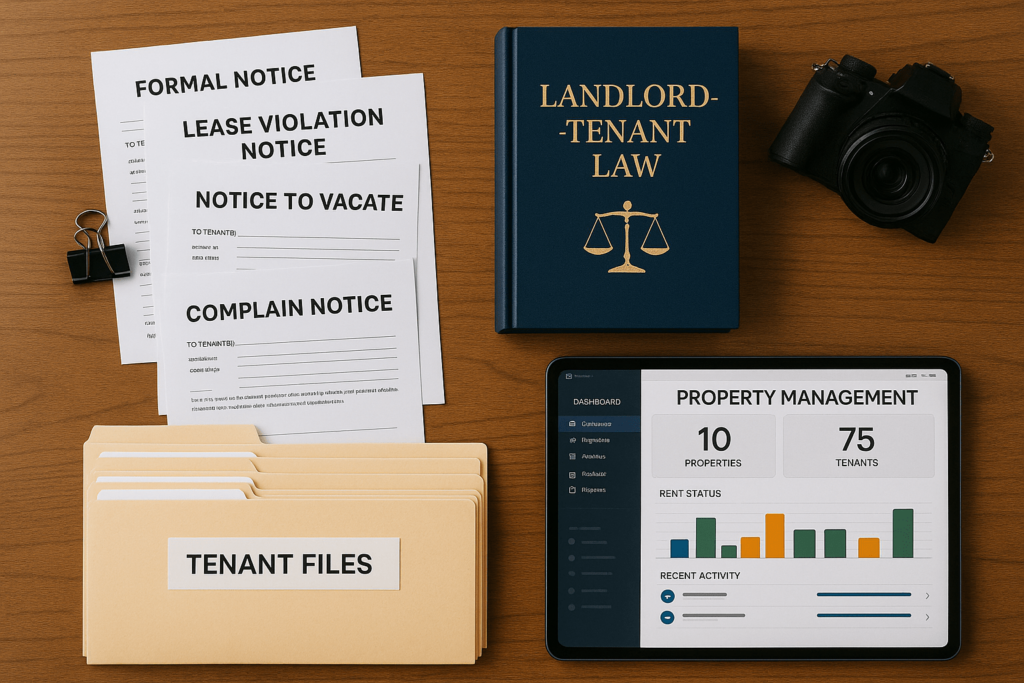
How to Handle Difficult Tenants Legally: Essential Steps for Landlords
Dealing with difficult tenants is a challenging part of being a landlord. Handling these situations legally protects your investment and peace of mind.
When facing problematic tenant behaviors, you need to know your legal obligations. Take appropriate action through proper documentation, clear communication, and follow eviction procedures correctly if necessary.
Understanding the legal framework helps you avoid costly mistakes that could result in legal battles or financial losses.
Many landlords struggle with late rent payments, property damage, or lease violations. You can address these problems by using thorough tenant screening, detailed lease agreements, and prompt response systems.
Professional property management services like Kanga Property Management help you navigate these situations while keeping you compliant with landlord-tenant laws.
Key Takeaways
- Document all tenant interactions and property conditions thoroughly to protect yourself legally during disputes.
- Use clear written communication and follow proper notice procedures when addressing lease violations or rent issues.
- Consult with legal professionals before proceeding with eviction to ensure you’re following all required steps correctly.
Understanding Your Legal Rights and Obligations as a Landlord
Being a landlord means you must understand the legal rules that define your relationship with tenants. Knowing your rights and obligations helps you manage difficult situations and stay compliant with the law.
Key Provisions in Lease Agreements
Your lease agreement is the legal foundation of your landlord-tenant relationship. This document should clearly outline:
- Rent amount and due dates
- Security deposit terms including amount and conditions for return
- Maintenance responsibilities for both parties
- Rules regarding property use and occupancy limits
- Termination procedures and notice requirements
A well-drafted lease protects you from disputes. Include provisions for late payments, property inspections, and lease violations that could lead to eviction.
If tenants violate lease terms, you can take action, but you must follow proper legal procedures. Landlord-tenant laws specify how and when you can enforce these provisions.
Have a legal professional review your lease to ensure it complies with current regulations and protects your interests.
The Role of Landlord-Tenant Laws
Landlord-tenant laws vary by state but usually cover similar topics. These laws establish:
- Habitability standards that require you to maintain safe, livable conditions
- Entry rights that determine when and how you can access the property
- Eviction procedures including required notices and court processes
- Security deposit handling including maximum amounts and return timelines
Always use legal channels when dealing with difficult tenants. Changing locks or shutting off utilities is illegal in most places.
If you need to evict a tenant, provide proper notice and follow court procedures. Acting outside these rules can result in penalties.
Some landlords hire a professional property management company like Kanga Property Management to help navigate these legal requirements.
Federal and State Antidiscrimination Laws
The Fair Housing Act prohibits discrimination based on:
- Race or color
- National origin
- Religion
- Sex (including gender identity and sexual orientation)
- Familial status
- Disability
You cannot refuse to rent, set different terms, or harass tenants based on these protected characteristics. This applies to advertising, screening, and all aspects of renting.
State and local laws may add more protected classes. Learn the regulations in your area.
You must make reasonable accommodations for tenants with disabilities, including allowing service animals even in no-pet properties. Tenants may make modifications at their own expense.
Violating these laws can lead to financial penalties and legal consequences. Document all tenant interactions and keep consistent policies to show fair treatment.
Common Types of Difficult Tenant Situations
Landlords often face challenging situations with tenants that require careful, legal handling. These issues can affect your rental income and property condition if not addressed properly.
Nonpayment of Rent
Tenants who don’t pay rent on time create cash flow problems and financial strain.
Signs to watch for:
- Consistent late payments
- Partial payments
- Repeated excuses
- Avoiding communication
Document everything when addressing nonpayment. Send formal written notices immediately when rent is late, following your state’s requirements.
Set up automatic payment systems or reminders to help prevent late payments. Your lease should state due dates, grace periods, and late fees.
If problems continue, you may need to begin eviction proceedings. Always follow legal channels.
Some property owners use professional services like Kanga Property Management to establish reliable rent collection systems.
Lease Violations
Lease violations happen when tenants break the agreed terms in your rental contract.
Common violations include:
- Unauthorized occupants
- Keeping prohibited pets
- Noise complaints
- Running a business from the property
- Smoking in non-smoking units
Address violations quickly with a written notice that:
- Identifies the violation
- References the lease clause
- States required corrective action
- Provides a reasonable timeframe for correction
Document all communication and take date-stamped photos if needed. If violations continue, issue a “cure or quit” notice according to local laws.
Apply rules equally to all tenants to avoid discrimination claims.
Property Damage and Negligence
Property damage beyond normal wear and tear can reduce your investment value and require costly repairs.
Thorough documentation is essential when dealing with property damage. Conduct regular inspections with proper notice and keep detailed records with photos.
Types of concerning damage:
- Water damage from neglected leaks
- Unauthorized modifications
- Broken fixtures or appliances from misuse
- Damage to walls, floors, or doors
When you find damage, act quickly. Notify the tenant in writing, detailing the damage, required repairs, who is responsible, and the timeline for resolution.
For severe damage that creates unsafe conditions, arrange emergency repairs. Your lease should clearly outline tenant responsibilities for property maintenance and care.
Steps to Address Tenant Issues Legally
Handling difficult tenants requires you to follow proper legal procedures. Systematic, documented steps help resolve issues and keep you compliant with Florida landlord-tenant laws.
Communicating Concerns Effectively
Start by addressing problems directly with your tenant. Clear communication often resolves issues before they escalate.
Send a professional, written message outlining specific concerns. For example: “The rent payment due on April 1, 2025, has not been received.”
Have face-to-face conversations in a neutral tone. Avoid accusations or emotional language.
Keep communications brief and focused on facts. Demanding tenants respond better when you remain calm and objective.
Follow up verbal discussions with an email or text summarizing what was discussed and agreed upon.
Providing Proper Notice
Florida law requires specific notices for different situations. Using the wrong notice type can invalidate your actions.
For late rent, provide a 3-day notice that states the amount owed and the deadline. The notice must include the exact wording required by Florida tenant law.
For lease violations, issue a 7-day notice that details the violation and whether it’s curable or non-curable.
Post notices properly—hand-deliver, leave at the residence, or mail if your lease allows.
Important timelines:
- 3 days for non-payment of rent
- 7 days for curable lease violations
- 7 days for non-curable violations
- 15 days for month-to-month termination
Documenting All Interactions
Create a detailed record of all tenant interactions. This documentation is crucial if legal action becomes necessary.
Take date-stamped photos of property damage, lease violations, or maintenance issues. These provide visual evidence.
Save all communications, including:
- Emails and text messages
- Copies of written notices
- Records of phone calls (date, time, summary)
- Maintenance requests and responses
Use a simple tracking system to log every interaction. A spreadsheet with dates, communication methods, and brief descriptions works well.
Written records protect you if a tenant claims they weren’t notified or alleges retaliation.
Engaging a Landlord-Tenant Attorney
If problems persist, consult with a qualified landlord-tenant attorney. Legal guidance helps you avoid costly mistakes.
Interview several attorneys to find one with rental property experience. General practice lawyers may miss important details.
Prepare for your consultation by organizing your documentation chronologically. This helps the attorney understand the situation quickly.
Attorney-client privilege protects your communications. You can speak freely about the situation.
Many property owners use professional management companies like Kanga Property Management to help prevent tenant issues through proper screening and enforcement.
An attorney can help you determine if your tenant’s actions violate Florida landlord-tenant laws and provide legal strategies for addressing the situation.
Handling Eviction in Compliance With the Law
Eviction is a legal process that requires you to follow the rules exactly. Strict adherence to state and local regulations protects both landlord and tenant rights.
Initiating the Eviction Process
Before starting an eviction, you must have valid legal grounds. Common reasons include non-payment of rent, lease violations, illegal activities, or property damage.
Never attempt “self-help” evictions like changing locks or removing belongings.
Serve the tenant with proper written notice first. The notice type and waiting period vary by location and eviction reason:
- 3-day notice to pay rent or quit
- 30-day notice for lease violations
- 60-day notice for tenants residing over one year
Document everything carefully. Take dated photos of property damage and keep copies of all communications.
Consider hiring professionals to handle this process. Kanga Property Management can navigate evictions while ensuring full legal compliance.
Understanding Unlawful Detainer Actions
An unlawful detainer action is the formal legal term for an eviction lawsuit. This proceeding determines whether you can legally remove a tenant from your property.
You can only file this action after serving notice and waiting the required time period. If the tenant hasn’t vacated or fixed the issue, you may proceed with court filing.
Tenants may defend against unlawful detainer by claiming:
- Improper notice
- Retaliation
- Discrimination
- Uninhabitable property conditions
Maintain proper documentation of all maintenance requests and property conditions. Address tenant complaints promptly to avoid legal complications.
Filing an Eviction Lawsuit
When you file an eviction lawsuit, gather your documentation carefully. Required documents typically include:
- The lease agreement
- Proof of notice delivery
- Evidence of violations
- Rent payment records
File your paperwork at the courthouse in the county where your property is located. Pay the filing fee, which usually ranges from $50-$300.
After you file, the court schedules a hearing date and issues a summons for the tenant. Arrange for these documents to be served professionally according to local laws.
Do not serve the documents yourself. At the hearing, present your case with clear evidence.
If the judge rules in your favor, you receive a judgment for possession. Only law enforcement can remove tenants after the judgment, usually allowing a 5-10 day grace period.
Managing Security Deposits and Rental Property Maintenance
Handle security deposits and maintain your rental property properly. These tasks involve legal requirements and practical steps to protect your investment and maintain good tenant relationships.
State Laws Governing Security Deposits
Security deposits provide financial protection against property damage or unpaid rent. Each state sets rules on the amount you can collect and how you must handle these funds.
For example, in New York, landlords must transfer all security deposits to new owners within five days if the property is sold or return them to tenants.
Most states require you to keep deposits in separate accounts. You must return deposits within 14-60 days after lease termination and provide itemized lists of deductions.
Some jurisdictions require you to pay interest on deposits. Never use security deposits for operating expenses.
Document the property’s condition before and after tenancy with dated photos and inspection reports. This helps prevent disputes about damages versus normal wear and tear.
Repair and Deduct Remedies
Respond promptly when tenants report maintenance issues. The law requires you to maintain properties according to housing codes and safety standards.
If you do not address repair issues, tenants may:
- Use repair and deduct remedies and subtract costs from rent
- Withhold rent until repairs are made
- Break the lease without penalty in serious cases
Set up a clear maintenance request system and respond within 24-48 hours. Document all communication about maintenance in writing.
For complex issues, consider hiring a professional service like Kanga Property Management to help you stay compliant.
Preventing Legal Issues With Tenants
Preventing problems is easier than solving them after they start. Take proactive steps to save time, stress, and legal costs.
Conducting Thorough Background Checks
Background checks help you avoid problem tenants. Run a thorough check on all applicants before signing a lease.
Check credit history, criminal background, previous landlord references, employment, and income (aim for income three times the monthly rent). Do not skip this step, even if you want to fill a vacancy quickly.
A professional screening service is a small investment compared to the cost of eviction. Keep records of all applications, screening reports, and your reasons for approval or denial.
This documentation protects you from discrimination claims.
Building Good Tenant Relationships
Clear communication helps avoid conflicts with tenants. Use a comprehensive lease agreement that spells out expectations, rules, and responsibilities.
Schedule regular property inspections with proper notice. Promptly respond to repair requests to show tenants you care about them and the property.
Consider property management software to track maintenance, rent payments, and communication. This keeps everything organized for both parties.
For larger properties, professional management companies like Kanga Property Management can help maintain good tenant relationships and ensure legal compliance.
Treat all tenants with respect and professionalism, even during disagreements. Small gestures like holiday cards or reminder emails can build goodwill.
Navigating Discrimination and Public Housing Concerns
Knowing discrimination laws and public housing regulations is essential for legal and ethical property management. These rules protect both tenants and landlords.
Recognizing Housing Discrimination
Housing discrimination happens when a landlord treats tenants unfairly based on protected characteristics. The Fair Housing Act bans discrimination based on race, color, religion, sex, disability, familial status, or national origin.
Signs of discrimination include refusing to rent to qualified applicants, setting different terms for different tenants, making discriminatory statements, steering tenants to certain neighborhoods, or not providing reasonable accommodations for disabled tenants.
If you suspect discrimination, document all interactions carefully. This record is crucial if legal action is needed.
Professional property managers like Kanga Property Management can help you stay non-discriminatory by using standardized applications and consistent screening.
Complying With Fair Housing Laws
You must follow fair housing laws in all parts of property management. This covers advertising, tenant selection, maintenance, and eviction.
To stay compliant:
- Create clear, written policies for tenant selection and property rules
- Apply all policies consistently
- Document all tenant interactions and maintenance requests
- Respond promptly to accommodation requests
- Train all staff on fair housing laws
Some localities protect more classes than federal law. Check your local regulations to ensure full compliance.
Fair housing violations can lead to fines, loss of reputation, and legal trouble. Consult a housing attorney if you are unsure.
Legal Considerations for Public Housing
Public housing programs have extra legal requirements. If you accept housing vouchers or participate in public housing, learn the program rules.
Key points include:
- Many places ban discrimination against voucher holders
- Regular inspections may be required
- Rent increases must follow set procedures
- You may need to complete extra paperwork and verification
If tenants have issues with housing assistance, direct them to file a complaint with HUD if you cannot resolve the problem.
Public housing tenants have the same rights as other tenants, plus extra program protections. Learn these rules to avoid legal problems.
Resolving Disputes Through Alternative Legal Actions
You can often solve tenant issues without going to court. Alternatives can resolve conflicts efficiently and keep you legally protected.
Mediation and Arbitration
Mediation uses a neutral third party to help both sides reach an agreement. Mediation and negotiation can save time, money, and stress.
In mediation, you control the outcome. The mediator guides the conversation but does not make decisions.
Arbitration is more formal. An arbitrator reviews evidence and makes a binding decision.
Many leases include arbitration clauses. Check your contract before choosing this option.
Professional property managers like Kanga Property Management can help guide you through mediation.
Filing in Small Claims Court
Small claims court is a faster, cheaper legal option for disputes over small amounts. Use it for issues like security deposit disagreements or minor property damage.
To file, submit a complaint to your local small claims court and pay a filing fee (usually $30-$100). Serve notice to your tenant and present your case to a judge.
You do not need an attorney, but prepare your documents, such as the lease, photos, communication records, and financial statements.
Small claims limits vary by state, usually $3,000-$10,000. Cases often resolve within 1-2 months.
Accessing Online Legal Resources
Online platforms provide legal help for landlord-tenant disputes.
Many websites offer state-specific landlord-tenant law guides and templates for notices and agreements. These resources explain your rights and obligations.
Online document services help you create compliant notices and court filings with step-by-step instructions for your state.
Local government websites often publish free landlord-tenant handbooks.
Frequently Asked Questions
Landlords face many challenges with difficult tenants. Knowing your rights and responsibilities helps you maintain a professional relationship.
What are the legal grounds for evicting a problematic tenant?
You can usually evict for non-payment of rent, lease violations, property damage, illegal activities, or lease expiration without renewal. Gather documentation before starting the process.
In California, landlords must give proper notice periods depending on the violation. For non-payment, tenants usually get a 3-day notice to pay or quit.
Always follow legal procedures to avoid wrongful eviction claims. File the right paperwork with local courts and wait for legal approval before removing a tenant.
How can a landlord address constant complaints from a tenant without violating the lease agreement?
Document all complaints with dates and details. This creates a record if disputes arise.
Respond promptly and professionally to reasonable concerns. Keep written records of communications to show your good-faith efforts.
For frequent or unreasonable complaints, set a formal communication process. Require written submissions or schedule regular check-ins.
What steps should be taken when dealing with a verbally abusive tenant?
Stay calm and professional if a tenant is verbally abusive. Do not respond in kind.
Document every abusive interaction with specific details. Use written communication when possible for a clear record.
Have a witness present during in-person interactions if needed. In serious cases, seek legal guidance or involve professional property managers.
Are there any legal actions a landlord can take against a disrespectful tenant?
If a tenant’s behavior breaks lease terms, issue formal warnings citing the relevant clauses. Make sure your lease clearly states behavior expectations.
For violations or property damage, you can begin eviction after following legal procedures.
If eviction is not warranted but problems persist, try mediation services as a solution.
What indicators suggest that a tenant might be difficult, and how can a landlord proactively handle this?
Red flags include excessive negotiation during the application process. Reluctance to provide references or evasiveness about employment history also signal potential problems.
Trust your instincts, but base decisions on objective criteria. Conduct thorough background and credit checks on all applicants.
Look for previous evictions or a history of legal disputes with former landlords. These may indicate future issues.
Set clear expectations from the beginning. Use a detailed lease agreement with specific policies for noise, guests, maintenance requests, and payment terms to prevent misunderstandings.
How can landlords avoid illegal discrimination when identifying and managing difficult tenants?
Apply the same screening criteria to all applicants. Focus on objective factors like income verification, credit history, and references during your tenant selection process.
Document legitimate, non-discriminatory reasons for any adverse actions. This helps defend against potential discrimination claims.
Understand protected classes under fair housing laws. Do not make decisions based on race, color, national origin, religion, sex, familial status, or disability according to tenants’ legal rights.
Expert Tenant Management: Let Kanga Handle the Challenges
Addressing challenging tenant situations requires a delicate balance between assertiveness and legal compliance. Following the proper procedures—from documentation and communication to understanding eviction laws and dispute resolution options—protects your investment while minimizing potential liability.
However, navigating these complex legal waters can be stressful and time-consuming for property owners who lack specialized knowledge of tenant-landlord laws.
Kanga Property Management brings extensive experience in professionally managing difficult tenant situations while ensuring complete legal compliance at every step.
Our team handles problematic tenant scenarios with expertise, maintaining thorough documentation, following proper legal protocols, and resolving conflicts efficiently before they escalate into costly legal battles.
Partner with Kanga Property Management today and gain peace of mind knowing your property and legal interests are protected by experienced professionals who handle these challenging situations every day.



